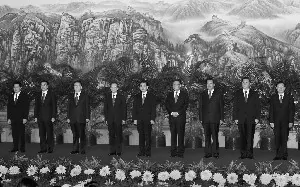解决中国大陆的难题
在我生活在中国的二十多年中,还从来没有见过外资企业象今天这样愤怒和迷茫。这种憎恨根本不是源于互联网检查、网络间谍、那些导致谷歌1月12日威胁退出中国大陆,或者那些因为谷歌事件带来的、有关人民自由和政府控制等价值观念上的冲突。愤怒的原因,是因为自从经济危机把美国和欧洲推入困境、把中共扭捏的推向世界舞台的中心时,外资企业觉得中共排外的思想和政策在日益膨胀、日益加剧。
阿波罗网来稿首发 http://www.aboluowang.com
参加公司总执行长的晚宴时,大家的对话全都是围绕着中共官员和中国商业伙伴们是如何的傲慢和无礼。一长串的故事包括对方故意前后不一,执行规定不透明,肆无忌惮的偷窃知识产权,政府通过工会和中共基层组织渗透西方大公司,利用暗算的产品标准和检测公然阻止产品进入市场,政治化的法院和政府机构几乎永远都偏向中国大陆的企业,别出心裁、选择性的实施世贸组织的规定等等,不一而足。
在中国大陆的外资企业对中国大陆老百姓和他们艰辛取得的成就怀有深深的敬意和情感。但许多外企高管都在扪心自问,他们是否被中共的体制给弄昏了头。外企是中国大陆的最佳公民,不得不给那些被强拉建立婚姻关系的中国大陆合资伙伴们提供大量的资本、技术、培训、源代码、最佳商业管理的规范,和带有知识产权的产品。他们也出资建立学校、孤儿院、灾后重建项目、海外奖学金、以及多种多样的扶贫项目。但现在,中国大陆市场对他们来说越来越重要了,但中国大陆对他们则越来越漠不关心。越来越难进的中国大陆市场是他们最现实的担忧。虽然许多公司在向前看,但他们夜不能寐,担心他们的合作伙伴也许会变成一个猛兽,他们自己的技术和特长会在世界范围内反咬他们一口,被那些受到补贴的巨型国企以低价策略的产品击败自己。
与此同时,我发现中共政府和企业界也从来没有象现在这样坐立不安、惶惶不可终日。它们的不安是缺乏安全感而产生的傲慢无理。全球金融风暴和中华人民共和国日益上升的国际地位,使得那些不敢冒风险、不喜欢突发事件、在统治中共的技术官僚们,放弃了原来精心拟订的国家发展规划。
中共国家主席胡锦涛和国务院总理温家宝承受的压力简直太大了。他们胆战心惊的要渡过他们任期的最后两年,要确保8 %或更高的增长率,并严厉镇压任何可能搅局的异议者。中国大陆的老百姓一般来说还挺满意,但共产党领导人则对民众的过高期望吓破了胆。四十岁以下的人,都是独生子女政策的后代,他们没有经历过毛泽东时代的贫困和动荡。他们往往被宠着,非常不耐烦,并且要求很高。他们觉得经济高速成长是生活的基本状态,获取讯息则是民众的权力。中国大陆的富人阶层,则是改革开放强有力的反对者。他们都是地方的既得利益者,想着要继续能够受益,而坚决反对外来的竞争。
中共领导人在空闲时间里,可能暗地里想着解决严重的腐败问题、严重的污染问题、浪费成性的医疗体制、七零八落的社会服务、根深蒂固的产能过剩、和人口的老化等问题。他们几乎没有多余的能力,也没有任何经验或者欲望,想要看远一点,成为世界所期望的、能够超越中共自己的需要的世界级领导人。
所以呢,中国大陆人和外国人,都有足够的麻烦和可以理解的恐惧。谷歌只是这个逐渐加剧的分歧的一个反映。问题的本质,是如何在中国大陆和由美国领衔的西方发达国家之间,寻求政治和经济的重新平衡。但这很难做到。中共和美国都有先例,非常善于把内部政策的失败归咎于外界的因素。两国互相指责的政客和捶胸顿足的爱国主义者,会使得理性的讨论几乎没有可能。但现在的确是太平洋两岸的领导人,趁事情还没有发展到失去控制之际,从沉重的国内问题中抬起头来,解决中国大陆与外国企业、与发达国家日益恶化的关系问题的时时候了。有一点是肯定的,他们肯定不会在谷歌上搜寻到这个问题的答案。
==================== =
The China Fix
By James McGregor
In my more than two decades in China, I have seldom seen the foreign business community more angry and disillusioned than it is today. Such sentiment goes beyond the Internet censorship and cyberspying that led to Google's Jan. 12 threat to bail out of China, or the clash of values (freedom vs. control) implied by the Google case. It is about the perception that antiforeign attitudes and policies in China have been growing and hardening since the global economic crisis pushed the U.S. and Europe into a tailspin and launched China to its very uncomfortable stardom on the world stage.
Visiting CEOs' banquet-table chatter is now dominated by swapping tales of arrogant and insolent Chinese bureaucrats and business partners. The litany includes purposefully inconsistent and nontransparent enforcement of regulations, rampant intellectual-property theft, state penetration of multinationals through union and Communist Party organizations, blatant market impediments through rigged product standards and testing, politicized courts and agencies that almost always favor local companies, creative and selective enforcement of WTO requirements ... The list goes on.
The foreign business community in China has deep respect and affection for the Chinese people and their hard-earned success. But more than a few foreign business leaders are asking themselves if they have been bamboozled by the system. Multinationals have been solid citizens in China, handing over heaps of capital, technology, training, source code, best practices and proprietary products to joint-venture partners they were forced into bed with. They have funded schools, orphanages, disaster reconstruction, overseas scholarships and all manner of poverty-alleviation programs. But now that the China market matters more to them, it appears that China couldn't care less. Increasingly difficult China-market access is the immediate worry. But many are looking ahead and losing sleep over expectations that their onetime partners are morphing into predators — and that their own technology and know-how will be coming back at them globally in the form of cut-price products from subsidized state-owned behemoths.
At the same time, I have also seldom seen the Chinese government and business community more unsettled and uncertain. Theirs is an arrogance borne of insecurity. The global financial chaos and China's rocketing global status threw off the meticulous national development schedules carefully crafted by the risk-averse and surprise-allergic engineers who run the Party.
The pressures on Chinese President Hu Jintao and Premier Wen Jiabao are overwhelming. They are white-knuckling their way through their final two years in office, focusing on 8% or higher growth and crushing any dissent that could derail it. The Chinese people are generally pretty happy, but the Party leadership is terrified of their outsized expectations. People under age 40, the progeny of the one-child policy, didn't live through Maoist poverty and upheaval. They are pampered, impatient and demanding. They consider exponential growth as a basic benchmark of life, and access to information to be a civil right. China's rich are powerful opponents of further reform and opening. They made money the local way and are determined to block foreign competition so this can continue.
In their spare time, China's leaders are reaching under the carpet to tackle the country's endemic corruption, epidemic pollution, emaciated health care, shredded social services, entrenched industrial overcapacity and swiftly aging population, to name a few. They have little remaining bandwidth, and no experience or desire to be the visionary and magnanimous world leaders who can look beyond China's own often desperate needs that the world wants them to be.
So both Chinese and non-Chinese have legitimate challenges and understandable phobias. Google is just a proxy in this intensifying dispute. It's really about rebalancing the economic and political dynamic between China and the developed world, with the U.S. as the key negotiator for the West. It won't be easy. China and the U.S. are past masters at blaming their domestic policy failings on outsiders. Finger-pointing politicians and chest-beating nationalists in the two nations will make rational discussion nearly impossible. Yet it is time for leaders on both sides of the Pacific to lift their heads above overwhelming domestic concerns and fix China's deteriorating relationship with foreign business and the developed world before things get out of control. One thing's certain: they won't find the answers through Google.















